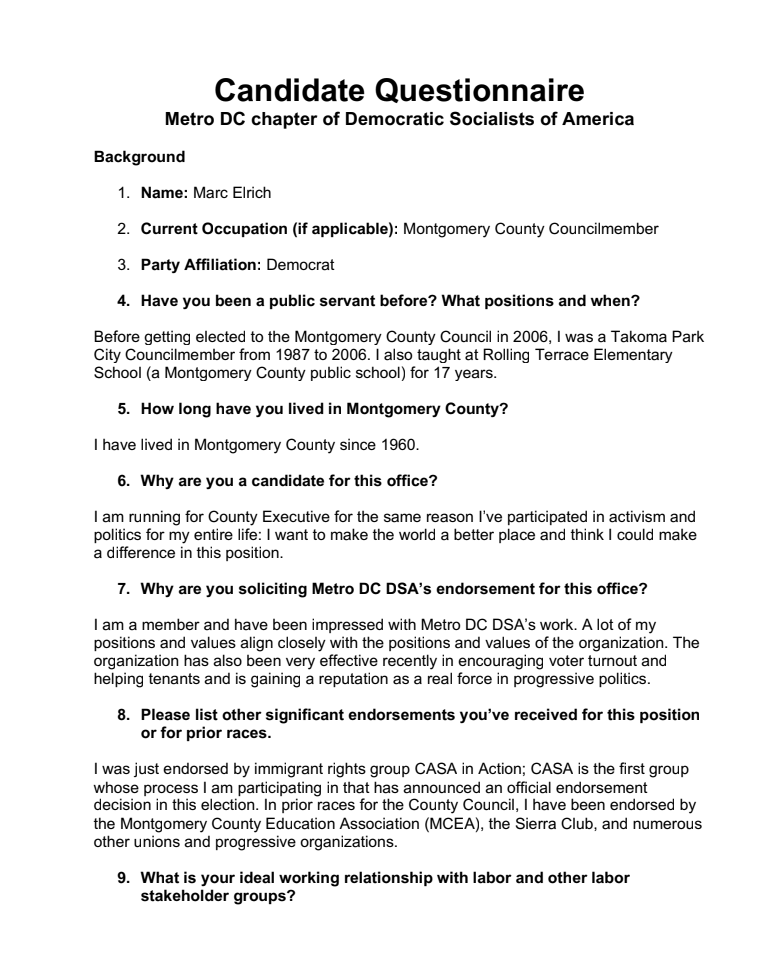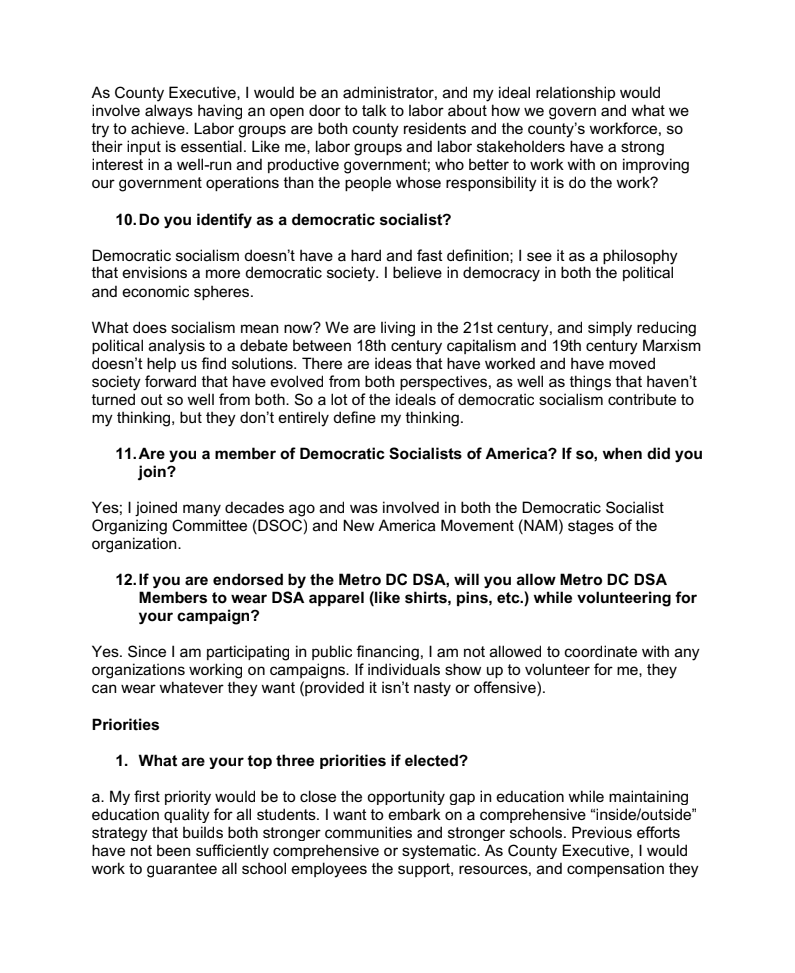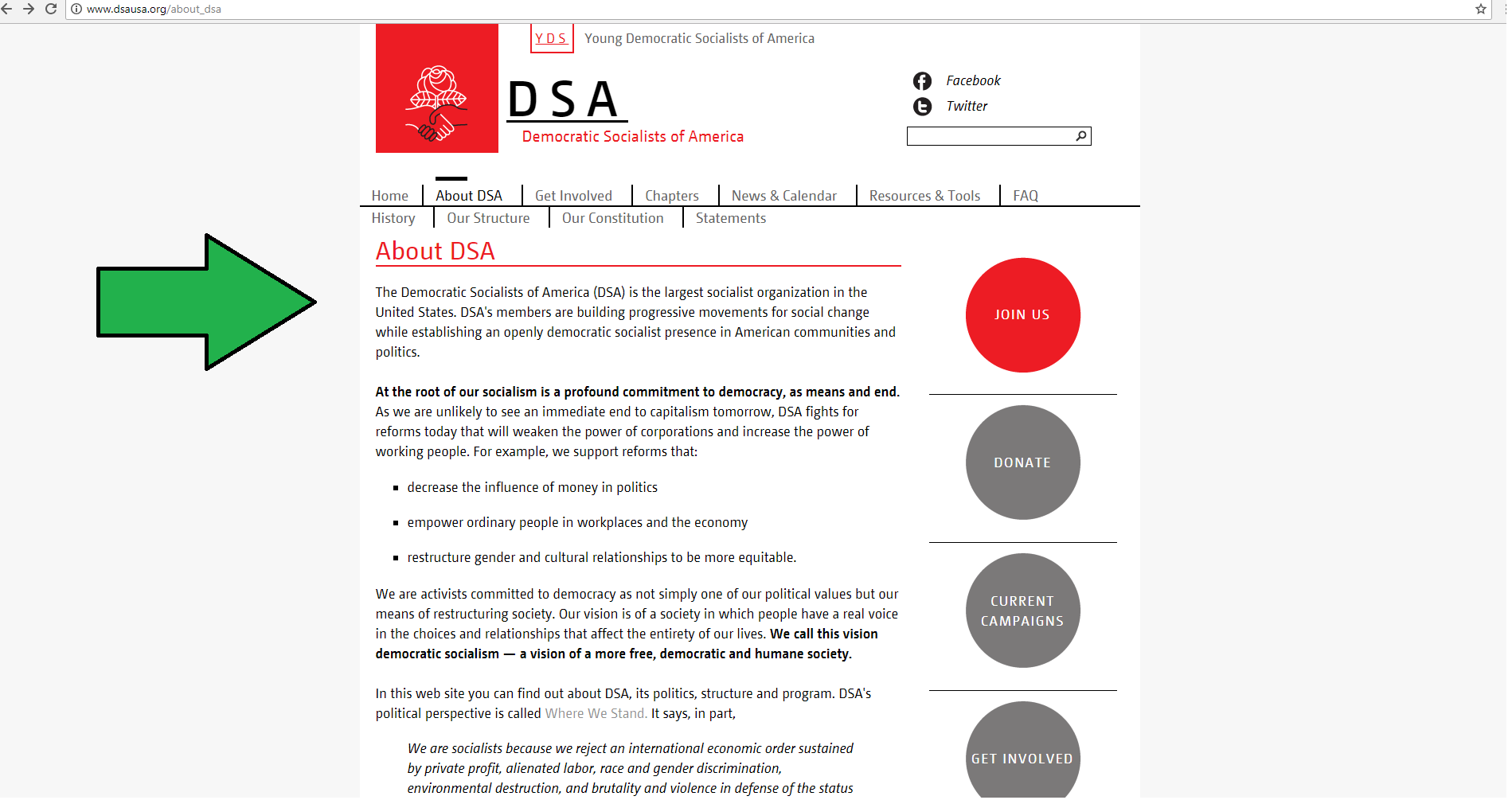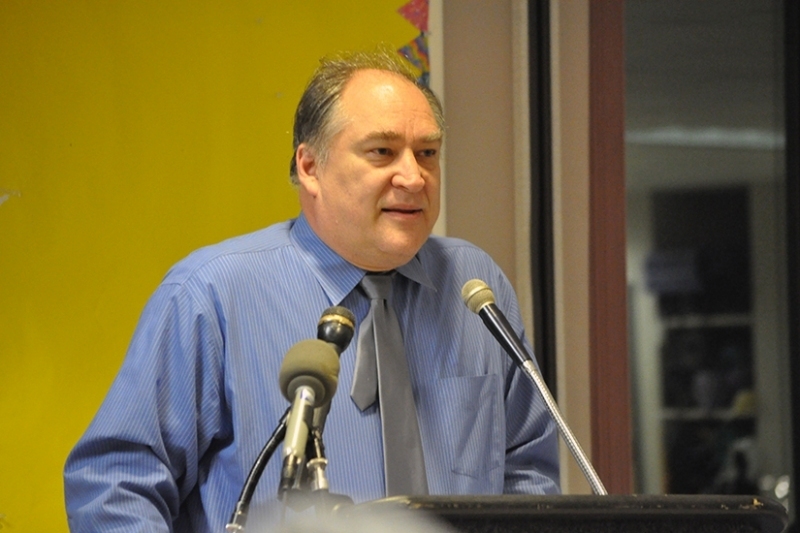By Adam Pagnucco.
Council Member Marc Elrich, who is running for County Executive, has posted a guest blog denying that he is a socialist. Since he made that claim in a rebuttal to our writings, it is only fair that your author responds. Why have we said that he is a socialist? It’s because we have an unimpeachable source who says he has been a socialist organization member for decades. That source’s name is…
Marc Elrich.
In 2013, Bethesda Magazine asked Elrich flat out whether he is a socialist.
Elrich declines to say whether he considers himself a socialist. “It’s irrelevant,” he says. “…I was in the business world. I appreciate how things are done. I’m not doing anything that will undo the business world or bring socialism to Montgomery County.”
If he is not a socialist, why not say so?
Elrich was more forthcoming with the Democratic Socialists of America (DSA), who describe themselves on their website as “the largest socialist organization in the United States.” In his completed questionnaire for DSA, Elrich answered as follows to their questions on his membership and identification as a socialist.
Why are you soliciting Metro DC DSA’s endorsement for this office?
I am a member and have been impressed with Metro DC DSA’s work. A lot of my positions and values align closely with the positions and values of the organization. The organization has also been very effective recently in encouraging voter turnout and helping tenants and is gaining a reputation as a real force in progressive politics.
Do you identify as a democratic socialist?
Democratic socialism doesn’t have a hard and fast definition; I see it as a philosophy that envisions a more democratic society. I believe in democracy in both the political and economic spheres.
What does socialism mean now? We are living in the 21st century, and simply reducing political analysis to a debate between 18th century capitalism and 19th century Marxism doesn’t help us find solutions. There are ideas that have worked and have moved society forward that have evolved from both perspectives, as well as things that haven’t turned out so well from both. So a lot of the ideals of democratic socialism contribute to my thinking, but they don’t entirely define my thinking.
Are you a member of Democratic Socialists of America? If so, when did you join?
Yes; I joined many decades ago and was involved in both the Democratic Socialist Organizing Committee (DSOC) and New America Movement (NAM) stages of the organization.


It’s worth noting the history of the two organizations he cited in his response. The Democratic Socialist Organizing Committee was founded by socialist leader Michael Harrington, who personally identified with socialists like Eugene Debs and Norman Thomas but preached advocating for a socialist agenda inside the Democratic Party. The New American Movement was an openly socialist group. According to its Wikipedia entry:
In its early years, NAM shared much of the political framework of the New Communist Movement, but rejected the strategy of building a “vanguard party”, a position prominent NAM members defended in a debate in the pages of The Guardian. The organization was built around local groups called “chapters,” which emphasized Marxist study, discussion of contemporary issues, support of local labor actions, and work in the community to raise awareness.
These two socialist organizations combined to form DSA in 1982.
The Democratic Socialists of America don’t hide the fact that they are socialists. They say it openly on their website.

Now let’s be fair. Today’s American socialists have come a loooooong way since dialectical materialism and the dictatorship of the proletariat. Karl Marx wouldn’t recognize them as socialists. Their platform is much closer to contemporary progressivism than to nineteenth century Marxism. And like DSA’s co-founder, Michael Harrington, their agenda is not actual revolution but to join the Democratic Party and push it as far to the left as possible. That’s a reasonable description of Marc Elrich’s three decades in public office and a big reason why he is so admired by many Montgomery County progressives. In fact, if Elrich were to say in public that he has been a socialist organization member for decades, many of his supporters would probably love it and work even harder for him!
Elrich told Seventh State, “I don’t have a socialist agenda that I’m trying to bring here.” Well, maybe. A genuinely Marxist policy agenda would be precluded by federal and state law. But Elrich’s socialist beliefs have manifested themselves at least twice during his time as a County Council Member.
First, he is arguably the strongest supporter of an indisputably socialist institution: the county’s liquor monopoly. The notion that a county government should have a monopoly on the wholesale distribution of alcohol is about as socialist as one can get. Not only is Elrich one of the monopoly’s biggest defenders – he actually accused restaurant owners who wanted freedom from it of “whining” and wanting to “steal everything.” That got him banned from four restaurants that had protested the monopoly. As a County Executive candidate, he promises to increase the monopoly’s sales, thereby expanding the reach of MoCo’s most prominent socialist institution.
Second, Elrich once recruited the socialist government of Venezuela’s Hugo Chavez to participate in providing county services. In 2007, the Washington Post reported:
Montgomery County Council member Marc Elrich (D-At Large) invited Venezuela’s ambassador this month to meet community leaders and possibly get involved in funding local social programs, only to find himself yesterday at the center of a heated international political debate…
The visit, planned for Oct. 23, was conceived after Elrich met a representative from the embassy at a District rally to support domestic workers. They talked about poverty and the health-care needs of the county, and Elrich said the diplomat expressed interest in learning more about Montgomery’s community services.
In an e-mail to more than a dozen community leaders Tuesday, including to Leggett’s directors for economic development and health and human services, a legislative aide to Elrich described the visit as part of a “project currently underway to promote future socio-economic partnerships for the development of a common goal to address community needs.”
“The first step toward this goal is to convene a meeting to introduce the Ambassador” to the county and “to begin a dialogue on how to productively address those needs,” the e-mail said…
Talk of a visit was so potentially explosive that [County Executive Ike] Leggett issued a strongly worded statement from Israel. “We do not want to be involved in this visit. We are not involved with this visit,” he said. “Montgomery County can take care of its own problems. Thank you. No thank you.”
The visit did not happen and Elrich’s envisioned cooperation between the county and a socialist foreign government fell through.
Look folks, we respect Marc Elrich for having deeply held principles that have guided his political philosophy for many years. Some politicians have no principles of any kind. Elrich has deployed his on behalf of progressive causes like his signature minimum wage bills. His supporters love him for that, and from their perspective, rightly so. We have found him to be a creative, intelligent and thought-provoking Council Member. And he deserves massive credit for authoring the county’s proposed Bus Rapid Transit system ten years ago. But Elrich has told “the largest socialist organization in the United States” that he is a member who “joined many decades ago.” He put that in writing.
So why not just admit it to the rest of us?
Disclosure: the author wrote this in reply to Marc Elrich’s guest blog and supports Roger Berliner for Executive.









